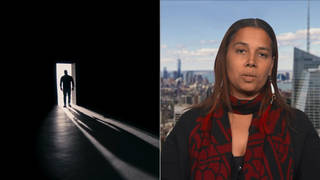
By Amy Goodman & Denis Moynihan
There has been much attention, and rightly so, on the CIA’s extensive use of torture, which the Senate Select Committee on Intelligence is said to have documented in its still-classified 6,000-page report. The use of torture is not limited to the CIA, however. It is all too common across the United States. Solitary confinement is torture, and it is used routinely in jails, prisons and immigration detention facilities here at home. Grass-roots movements that have been pressuring for change are beginning to yield significant results. The coalitions include prisoners, their families, a broad swath of legal and social-justice groups and, increasingly, prison guards and officials themselves.
One official who worked to reduce the use of solitary confinement was Tom Clements. The executive director of Colorado’s Department of Corrections, Clements was at home on March 19, 2013, when his doorbell rang. As he opened the door, he was gunned down, murdered by Evan Ebel, who had been released from solitary confinement directly to the street less than two months earlier. The small, nonprofit Colorado Independent was the only outlet to link the murder to the psychological damage that Ebel suffered in solitary confinement. Another ex-prisoner who corresponded with Ebel disclosed text messages with him, shortly before Ebel killed Clements. One text read, “im just feeling peculiar & the only way i know i know to remedy that is via use of ‘violence.’”
Ironically, Clements was trying, successfully, to reform Colorado’s solitary-confinement policies, referred to there as “administrative segregation.” A year before his murder, Clements told The Colorado Independent’s Susan Greene, “There’s a lot of research around solitary and isolation in recent years, some tied to POWs and some to corrections … long periods of isolation can be counter-productive to stable behavior and long-term rehabilitation goals.” He was concerned with the direct release of prisoners from solitary back into the community, a practice that likely contributed to his murder. His successor, Rick Raemisch, continues to pursue the reforms started by Tom Clements. Raemisch subjected himself to over 20 hours in solitary, and emerged even more committed to changing the system.
Juan Mendez, the United Nations special rapporteur on torture, issued a special report on solitary confinement in 2011, concluding “Segregation, isolation, separation, cellular, lockdown, Supermax, the hole, Secure Housing Unit (SHU) … whatever the name, solitary confinement should be banned by states as a punishment or extortion technique.” His latest full report on global torture includes several noted alleged excesses by the United States, including abusive solitary confinement practiced from Afghanistan to Guantanamo Bay to New York state, Louisiana and California.
In California, prisoners went on hunger strike for months last year, protesting solitary confinement, gaining widespread public support and achieving some of their demands. In Louisiana, Albert Woodfox has been in solitary confinement for more than 42 years, found guilty of murdering a prison guard, despite the lack of any physical evidence linking him to the crime and eyewitnesses placing him elsewhere at the time. Courts have ordered his release three times, the most recent of which was appealed by the state of Louisiana. A federal appeals court is expected to decide on his case soon.
Studies have found that irreversible psychological damage can occur after just 15 days in solitary confinement. The UN’s Mendez alleges that New York state’s prison system is excessively harsh in its use of solitary. The New York Campaign for Alternatives to Isolated Confinement is pushing a bill, the Humane Alternatives to Long-Term (HALT) Solitary Confinement Act. The bill would limit such confinement to 15 days, and create special treatment facilities for prisoners suffering from mental illness, and grant more time outside the cell, including contact with others.
Even prison guards are weighing in against solitary. In Texas, Lance Lowry, president of AFSCME Local 3807 of the Texas Correctional Employees, wrote an open letter to Texas prison officials that called on them to reduce the use of solitary confinement, including on the state’s death row. He told me on the “Democracy Now!” news hour, “What we found is the overall use of solitary confinement in Texas was not serving its intended purposes. We went from a couple hundred lock-up cells to over 8,000 at one point.” Recidivism, violence and the overall financial costs of incarceration are all increased by the use of solitary confinement.
Most importantly, it’s torture. It’s time to put an end to solitary confinement.
Amy Goodman is the host of “Democracy Now!,” a daily international TV/radio news hour airing on more than 1,200 stations in North America. She is the co-author of “The Silenced Majority,” a New York Times best-seller.
© 2014 Amy Goodman
Distributed by King Features Syndicate











Media Options